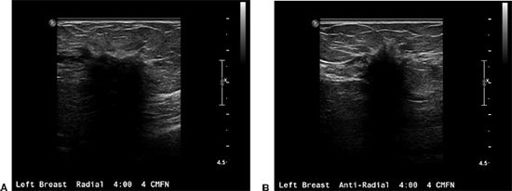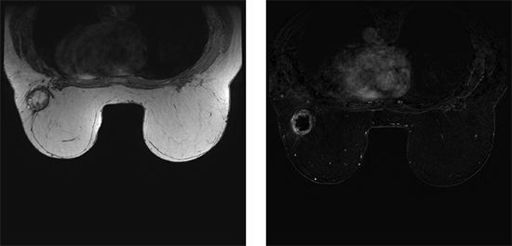Breast Imaging: A Core Review (17 page)
Read Breast Imaging: A Core Review Online
Authors: Biren A. Shah,Sabala Mandava
Tags: #Medical, #Radiology; Radiotherapy & Nuclear Medicine, #Radiology & Nuclear Medicine


A. Intraductal carcinoma
B. Duct ectasia with debris
C. Fibrocystic change
D. Intraductal papilloma
6a
Based on the following images, what would be the appropriate BI-RADS category?

A. BI-RADS 2
B. BI-RADS 3
C. BI-RADS 4
D. BI-RADS 5
6b
What is the appropriate recommendation?
A. Annual screening mammography
B. Short-term follow-up in 6 months
C. Core needle biopsy
D. Surgical excisional biopsy
7
A 45-year-old female presents with a palpable abnormality in the right breast. Based on the ultrasound image below, what is the most appropriate BI-RADS assessment?

A. BI-RADS 2
B. BI-RADS 3
C. BI-RADS 4
D. BI-RADS 5
8
A 35-year-old female with a history of a left lumpectomy, radiation therapy, and chemotherapy at age 29 presents for her annual diagnostic mammogram. Based on the magnification images of the lumpectomy site, what is the most appropriate next step?

A. 6-month follow-up
B. MRI
C. Stereotactic core biopsy
D. Annual screening mammogram
E. Annual diagnostic mammogram
9
A 40-year-old female was recalled from screening for calcifications in the right breast. Based on the magnification views, what is the most appropriate BI-RADS lexicon description for the calcifications?

A. Coarse heterogeneous
B. Secretory
C. Punctate
D. Pleomorphic
10a
A 50-year-old female was recalled from screening for a mass within the left breast. Based on images A and B, what is the best description of the mass shape and margins using the BI-RADS lexicon?

A. Round, obscured
B. Irregular, microlobulated
C. Irregular, spiculated
D. Round, speculated
10b
An ultrasound of mass was performed. Based on images A and B, what is the best BI-RADS lexicon description of the shape and margins of the mass?

A. Oval, spiculated
B. Oval, angular
C. Irregular, angular
D. Irregular, speculated
10c
The mass was also examined by elastography. Given the image below, which statement is correct?

A. The mass measures cystic or soft by elastography.
B. The mass measures hard or stiff by elastography.
C. The mass is indeterminate for stiffness by elastography.
D. The mass stiffness suggests malignancy by elastography.
11a
A 65-year-old female with a history of right mastectomy, contralateral prophylactic mastectomy, and bilateral TRAM flap reconstruction for right breast–invasive ductal carcinoma and DCIS presents for surveillance breast MRI. Axial T1-weighted and axial postcontrast subtraction images are provided. What is the most likely diagnosis?

A. Recurrent invasive ductal carcinoma
B. Fat necrosis
C. Breast abscess
D. Postsurgical seroma
11b
The patient’s left mammogram is also shown. No prior mammogram is available for comparison at this time. What is the most appropriate BI-RADS classification?

Other books
Death of a Showgirl by Tobias Jones
Home by Nightfall by Alexis Harrington
The Stinky Sneakers Mystery by Beverly Lewis
Finding the Way (A sweet romance) by Emma Rider
Dead and Kicking by McGeachin, Geoffrey
Bartered Bride: The Billionaire's Wife, Part 3 by Ava Lore
The Problem With Black Magic by Karen Mead
Death by Hitchcock by Elissa D Grodin
The 10 P.M. Question by Kate De Goldi
Irish Linen by Candace McCarthy